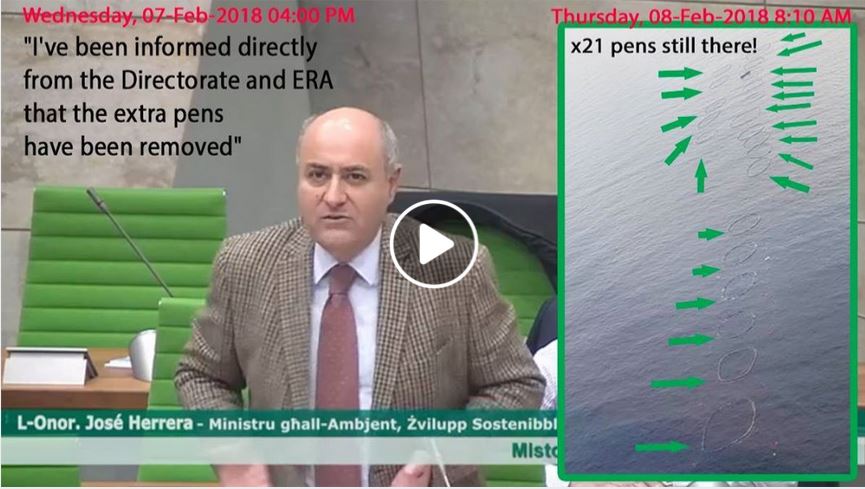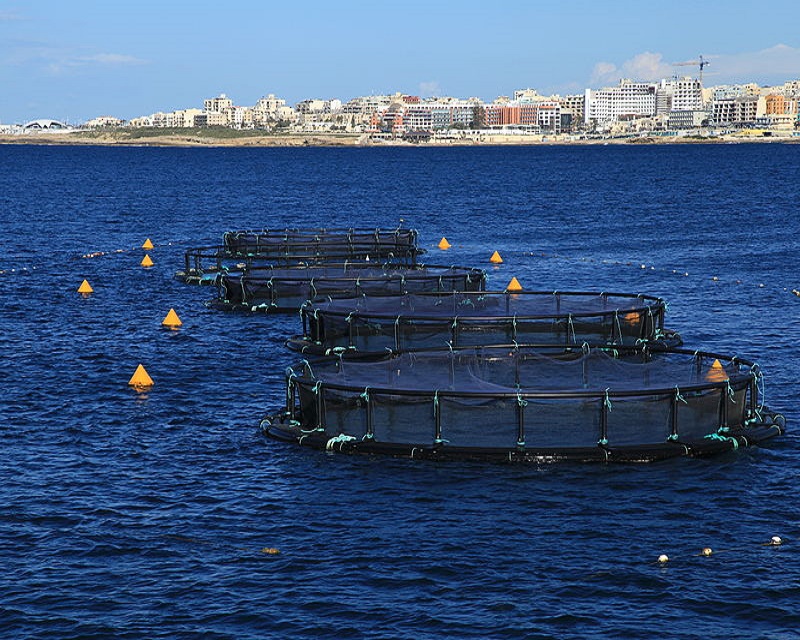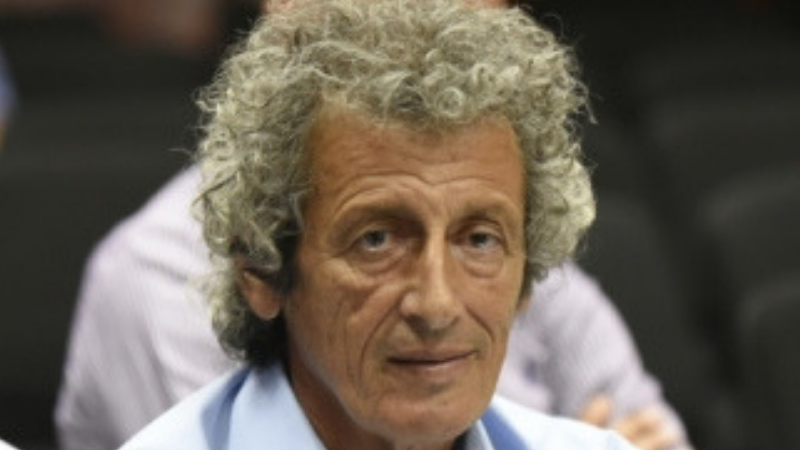The permit given by the Planning Authority to Azzopardi Fisheries doubling the tuna pens allowed near Sikka l-Bajda, off the north coast of Malta and within marine protected areas, has come under heavy criticism as the cages had already been on site illegally for many months, some even more than a year.
PD Leader and MEP candidate Godfrey Farrugia pointed this out in a video broadcast on his Facebook page. “The Planning Authority gave this permit as though it was unaware these pens had been on site for months. Petitions were launched, people complained about the slime that hit our shores in summer, we discussed it in Parliament and committees, but it all fell on deaf ears,” Farrugia said.
The PA gave its stamp of approval for Azzopardi Fisheries to now legally operate 24 pens instead of 12. The Shift News had published aerial shots of the cages on site showing the company had already illegally increased its cages.
Read: Caught in the act: Yet another cage headed to Azzopardi Fisheries’ tuna penning site
The Environment Minister had then told Parliament: “My Ministry, through the relevant regulatory agencies, has conducted the necessary inspections. They informed me that the information was correct; that there were nine or 10 additional cages there without a permit… but it also emerged, and this is no excuse, that these cages were empty. Orders were given for their removal”.

Photo: Stop the Slime campaign.
The cages remained on site, and now they have the PA’s blessing. The cages are located within two Natura 2000 sites which qualify as a Special Protection Area and a Special Area of Conservation.
Studies carried out on the area showed there would be a significant impact on the environment in the area. Birdlife Malta had said plans should only be approved after proper environmental impact assessments were carried out.
“This is the kind of Planning Authority we have,” Farrugia said. “Do you know the condition set for this permit? That the same amount of tuna the company had in 12 cages can now be placed in 24 cages. So what is referred to as ‘biomass’ should not increase. But can you ever believe that a businessman is going to invest that money to expand his business for the same yield? Who do they think they’re fooling?”
The Environment and Resources Authority noted that an increase in oil pollution due to more maritime traffic could pose a threat, and found that there would be a loss of habitat due to the deployment of moorings, shading effects and the introduction of alien species and disease-causing organisms.
Last year, all five of Malta’s tuna farms were fined for the occurrence of “slime” as well as additional breaches of their permit conditions. Nicolai Abela, the man behind the Stop the Slime campaign born in the summer of 2016 when unprecedented levels of greasy, white slime spread along the coastline stretching from Mellieha to Sliema, said it was then that the public had realised there was double the number of tuna pens permitted at the site operated by Azzopardi Fisheries.
The company had previously been asked to pay €30,000 to an environmental project fund for the area. Imposed as a condition for the temporary relocation of the 12 original pens to their current location, Azzopardi had contested the fee.
The Shift News had also revealed that the company, which has courted controversy since its first years of operation, has not filed its annual audited accounts to the Malta Financial Services Authority (MFSA) as required by law for 18 years.
A whistleblower working in the tuna farming industry had also told MaltaToday about the abuse in the sector, detailing how it benefitted from lax enforcement and got away with flagrant abuses.
Law enforcement authorities recently discovered a large stock of tuna caught hidden in a secret room in a warehouse in Żabbar, destined for local restaurants.

Some of the tuna cages owned by Azzopardi Fisheries off the North coast of Malta are regularly brought in close to shore causing an inconvenience to boat owners and residents in the area.
This followed an international scandal on the laundering of Bluefin tuna involving millions at the centre of which was Andreina Fenech Farrugia, the Director General of the Fisheries and Agriculture Department.
Read: Malta exposed: A hub for the ‘laundering’ of prized Bluefin tuna worth millions
El Confidencial published evidence of conversations between Fenech Farrugia and Jose Fuentes Garcia, a Spanish tuna kingpin, that were intercepted by the Central Operation Environmental Unit (UCOMA) in Spain with the help of Europol. The alleged international tuna ‘laundering’ ring was worth up to €25 million. She has denied the allegations but was suspended – on full pay.
Two months ago, five international environmental NGOs – WWF, ClientEarth, the Environmental Justice Foundation, Oceana and Fish4tomorrow – called for “concrete and immediate action” from Maltese EU Fisheries Commissioner Karmenu Vella.
Azzopardi Fisheries’ website boasts that tuna accounts for 1% of Malta’s GDP. Tuna are caught from the wild and fattened in cages, then sold to the Japanese market for tens of thousands of euro for a single fish.
Overfishing led to the almost complete collapse of the species, leading to the toughening of international regulations to control catch, at a huge cost to European taxpayers.













